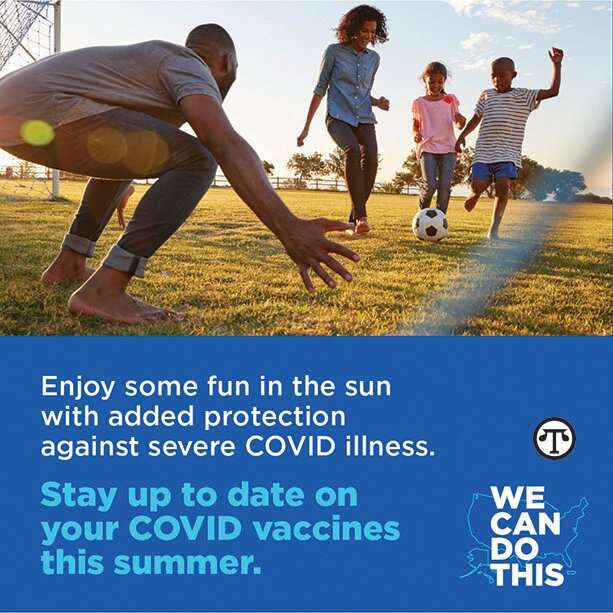FOR YOUR HEALTH: How Functional Fitness Can Help You Keep Up with the Grandkids
Fun with your grandkids is just one good reason to get physically fit.
(NAPSI)—One of the greatest joys—but potentially biggest challenges—for many grandparents is time spent with the grandkids. Whether yours are toddlers or teens, keeping them entertained requires a level of fitness that might include everything from lifting a child to chasing them at the playground to competing in a round of golf. For grandparents seeking an enriching and active experience with their grandkids, it’s important to engage in everyday fitness routines that can help:
- maintain muscle mass,
- preserve cardiovascular health,
- fortify flexibility, and
- bolster balance.
Functional fitness training can help with these goals.
What is Functional Fitness?
“Functional fitness uses multiple muscle groups and movements to help train muscles, joints, limbs, and nerves to all work better together for everyday tasks, like lifting groceries from the car, or outmaneuvering the grandkids,” says Jaynie Bjornaraa PhD, MPH, PT, who is vice president of rehabilitation services and fitness solutions at American Specialty Health Fitness.
Examples of functional fitness exercises include lunges, squats, and planks. “Lunges help improve balance and make the legs stronger,” says Dr. Bjornaraa. “Squats help strengthen the muscles used in sitting, standing, or lifting heavy objects safely. Core training, like planks, helps strengthen the lower back, hips, and abdominal muscles. A strong core provides a stable base when lifting, standing, or performing the chores of everyday life.”
There are many ways to incorporate functional fitness into an everyday fitness routine. For example, online workout classes such as Pilates, yoga, or strength training can provide easy access to beginner, intermediate, or advanced exercise routines. Gyms offer in-person classes plus access to most any kind of fitness equipment you may need to practice functional fitness, from mats and free weights to fitness balls and exercise bands.
If cost is a factor in joining a gym or fitness classes, programs such as the Silver&Fit® Healthy Aging and Exercise Program, which is available through certain Medicare Advantage plans, offer no-cost or subsidized low-cost access to thousands of standard name-brand gyms and YMCAs, in addition to premium boutique studios around the country. These programs may also include online access to fitness video classes such as dance, cardio, tai chi, Pilates, strength training, yoga, and others that teach proper form and technique. Nearly five million participants use the Silver&Fit program to help them stay fit.
“Functional fitness offers terrific health benefits for everyone, no matter your age or fitness level,” added Dr. Bjornaraa. “I encourage my friends, family, and clients to engage in some kind of functional fitness exercise every day to maximize the benefits.”
If you’re ready to try some functional fitness exercises but aren’t sure where to begin, you may care to check out a functional fitness exercise video called “3 Functional Exercises Using Only Body Weight.”
Learn More
For information about the Silver&Fit program, visit www.silverandfit.com.





 Many families may be surprised at how much young adults need health insurance—and how easy it can be for them to get it.
Many families may be surprised at how much young adults need health insurance—and how easy it can be for them to get it.



 (NAPSI)—You work hard to help keep yourself and your loved ones healthy. To help, the National Institute of Neurological Disorders and Stroke (NINDS) reminds everyone that stroke is a leading cause of death and disability in the United States. About 800,000 people in the country have a stroke each year. The good news is, when treated quickly, survival is possible and damage can be greatly reduced. That’s why understanding your risk for stroke, knowing signs of stroke, and acting in time are critical and can make all the difference for you or someone you care for. If you have a greater chance of stroke, there are also steps you can take now to help prevent one.
(NAPSI)—You work hard to help keep yourself and your loved ones healthy. To help, the National Institute of Neurological Disorders and Stroke (NINDS) reminds everyone that stroke is a leading cause of death and disability in the United States. About 800,000 people in the country have a stroke each year. The good news is, when treated quickly, survival is possible and damage can be greatly reduced. That’s why understanding your risk for stroke, knowing signs of stroke, and acting in time are critical and can make all the difference for you or someone you care for. If you have a greater chance of stroke, there are also steps you can take now to help prevent one. Maine, known for its iconic lighthouses, stunning coastlines, and rich history, is now becoming recognized for another reason: its aging population. As the oldest state by median age in the U.S., Maine faces unique challenges in supporting its senior residents. However, the state is also pioneering innovative strategies for healthy aging and improving senior care.
Maine, known for its iconic lighthouses, stunning coastlines, and rich history, is now becoming recognized for another reason: its aging population. As the oldest state by median age in the U.S., Maine faces unique challenges in supporting its senior residents. However, the state is also pioneering innovative strategies for healthy aging and improving senior care.